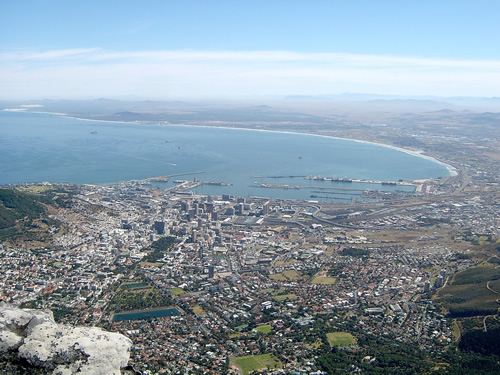Study Abroad Participant Report
Study Abroad in Cape Town, South Africa
On Being an Student with Respect, Sensitivity, Empathy, and Genuine Curiosity
By Adam Karlin

|
|
Cape Town, South Africa.
|
The first three months I studied in South Africa were the best of my life. The second three months of a return semester were the worst a year later.
Let’s make this clear: Studying abroad can be intense.
Especially when a deep component of your program involves teaching and community development. I don’t mean to use that term lightly: It’s often good to do good, especially when studying in the "Global South." Be it teaching, community development, or any other way to use your comparative privileges and education to help less developed parts of the world, these sorts of activities teach you far more than a university classroom ever will.
In South Africa, I worked with the Amy Foundation in their after-school department, volunteering to play and tutor children in some of Cape Town’s poorest shantytowns. Each student in our program was driven out, every day, to schools where we found ourselves in a world entirely removed from collegiate comfort. Tin-and-wood shacks. Appalling crime. And the economic trauma of the desperately poor, combined with the remarkable resilience of communities that weather poverty.
I say "every day," but that isn’t entirely true, and that’s where "do-gooding" difficulties start to arise. Usually, when we drove out to a school, clouds of kids would surround our vans and pound on the windows, bursting with joy. But then there were the days when you couldn’t or wouldn’t participate. Because you had an exam or were exhausted from crossing the lines between the "Global North" and the "Global South." Perhaps you had far more mundane excuses: You got too drunk the night before.
It’s one thing to disappoint a professor by not attending class. Yet, it’s entirely another to disappoint a school full of South African children.
Developing Cultural Sensitivity and Learning Local Social Mores
Or what happens when, like me, you start to identify with the children you are teaching to the point that you believe they are, in some way, your children? Your responsibility? What happens when those kids misbehave? How do you handle it when another well-intentioned and dedicated American student brings new basketballs to school, and the kids don’t get to play with them? When they fight over the cookies you brought to school as a special snack? When an adult yells at one and smacks him in the face?
I hesitated when the boys I taught acted up, got angry and jealous at the new basketballs, stared in shock as they fought in the dust for half a cookie, and almost yelled at the adult, in that order. All of the above helped me grow in ways that do not happen in the confines of a typical college campus. The above were some of the most challenging, painful lessons I have ever learned.
It was worth more than I can describe, but equally challenging. The important thing was allowing myself to connect. I did not hold back. I let myself become an open vessel to all the experiences on offer.
I’ll offer this advice for those who go to the "Global South" to study abroad and are thinking of working in development, aid, teaching, etc.:
First of all, if you have a choice, try it. Nothing ventured, nothing gained. However, you will want to research any organizations you work with (your university should help with this process). Be warned that you may have to create work for yourself, especially at shoestring-budget programs.
Second: You can’t save the world. Or the country you are in. Even if you had the money to provide a village with running water and vaccinations, there are other villages over the next hill, and they probably just became jealous of the neighbors you helped. But you can help individuals. Forging connections is part of the beauty of going abroad. Try to leave a legacy, anything from a self-sustainable development program to a new pen pal.
Third: Remember what you represent, and remember who you help. As an American in the Global South, you must act mature beyond your years because you may be the only firsthand American exposure locals will ever experience. Most importantly, the locals themselves have their own customs to respect. If you can’t learn the language (and you should at least learn some basics), learn as much as is offered about the culture, rituals, and history. If locals dress modestly, so should you. Don’t violate your principles, but be open to letting the children grow: I became open to new ideas in South Africa, but when that adult struck one of the kids I worked with, I vocally objected.
Finally: Don’t let the country become an extension of yourself. A materially poorer country doesn’t exist to make you feel better about your place in the world. It has its own history, identity, and narrative, and you are privileged to help them, not the other way around. This sounds like an easy lesson, but I believe it’s the one most commonly forgotten by even experienced aid workers. Remember: doing good in the world’s badlands is an enormous challenge, especially given the chance of introducing unintended consequences. And the opportunity to offer help while facing the complexities with empathy and an open mind is about as much as we students have to offer.
|
